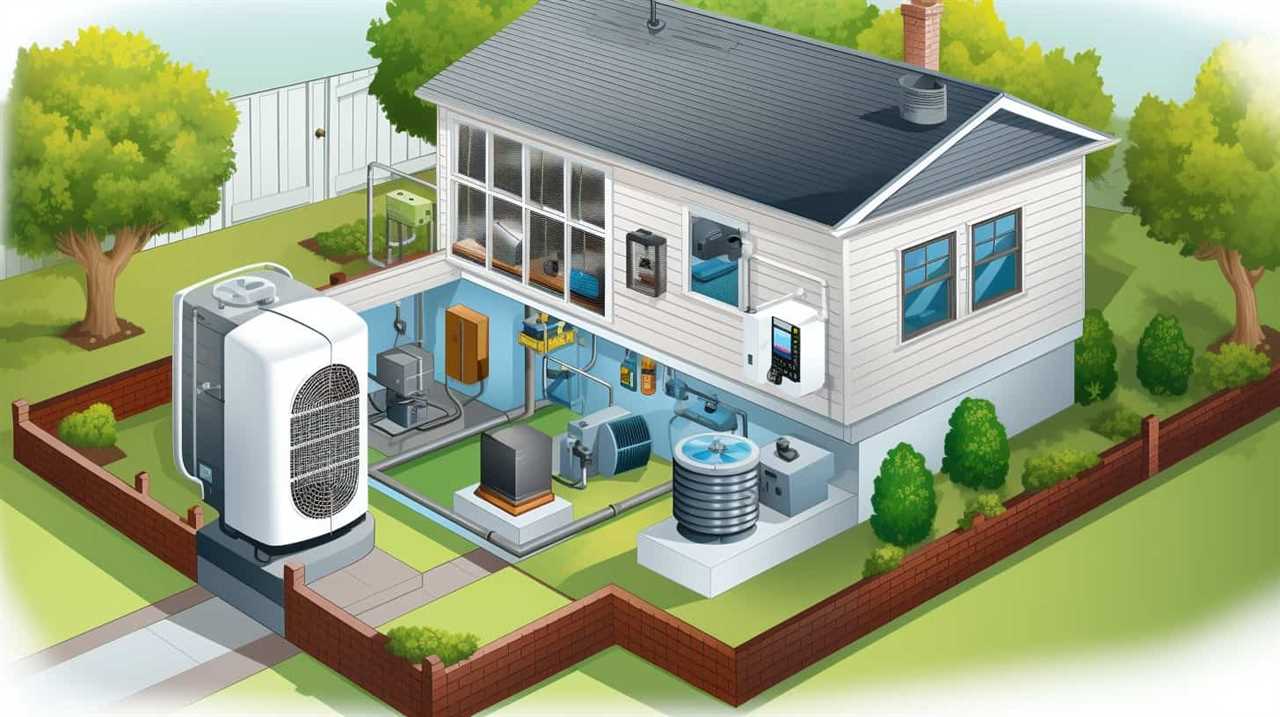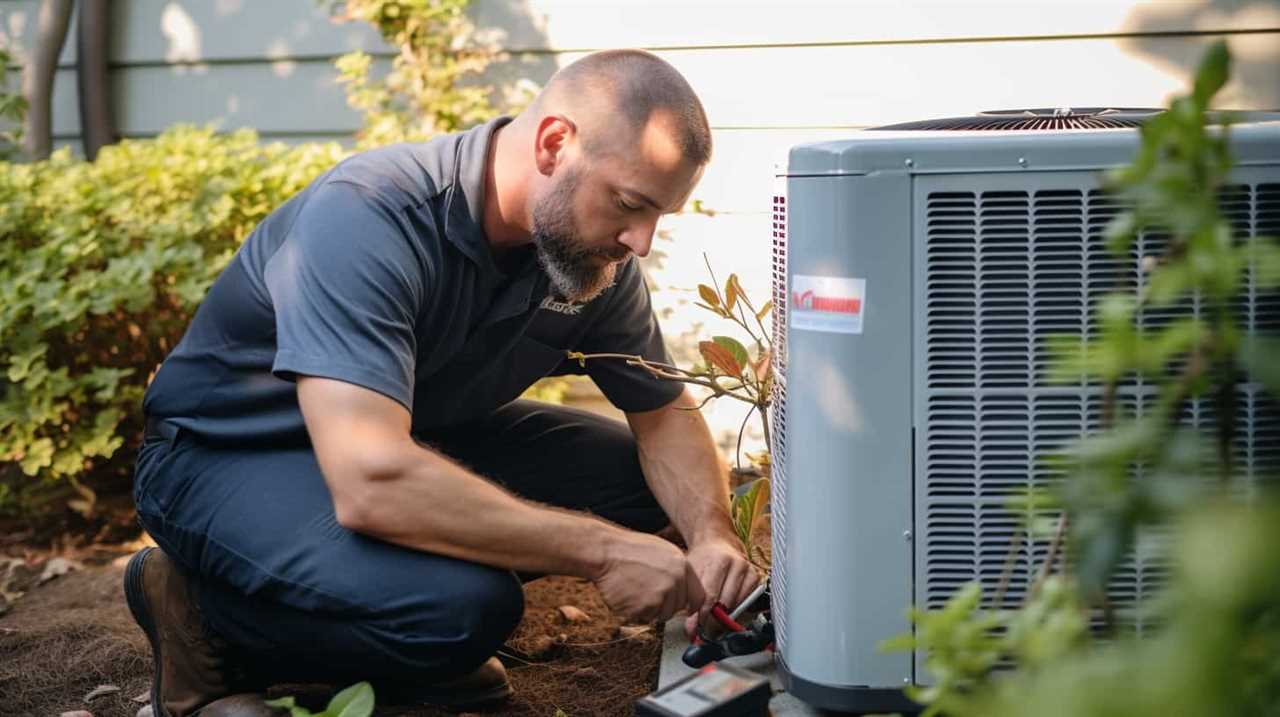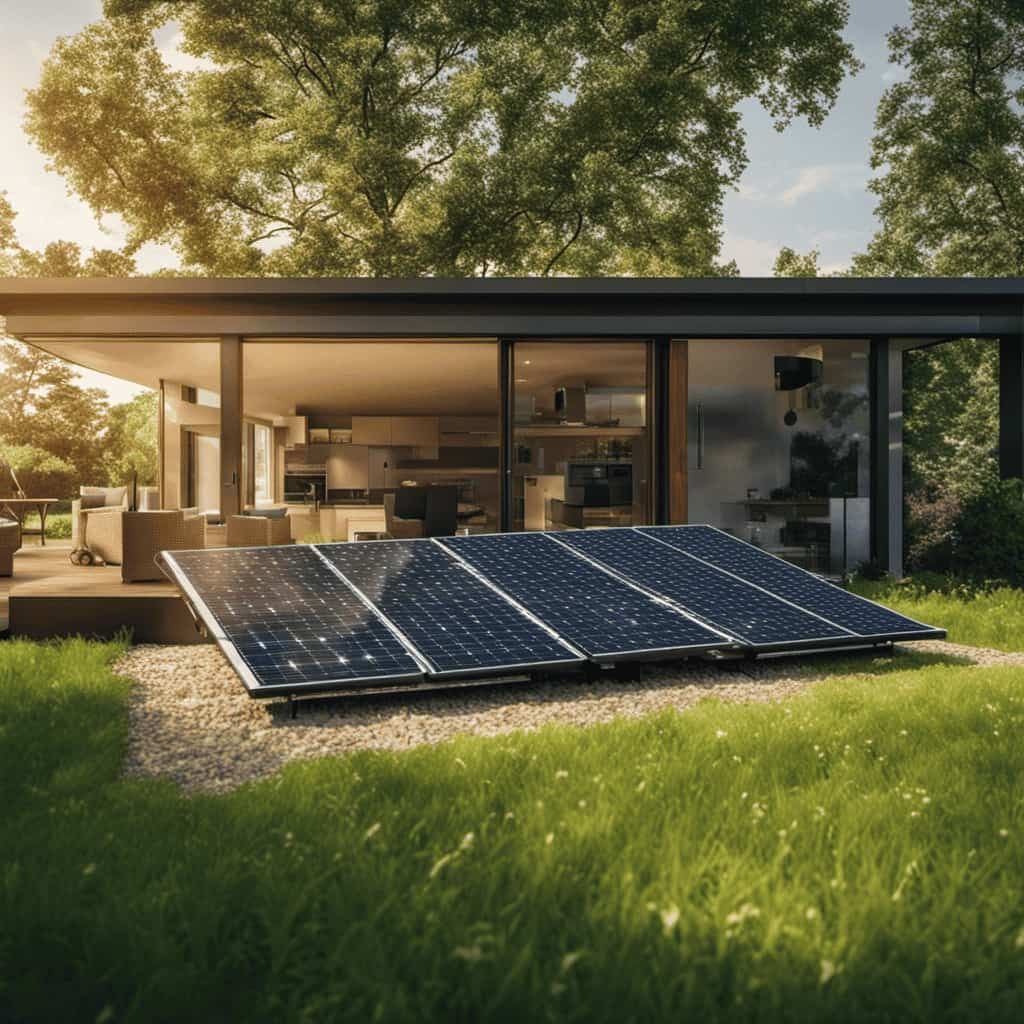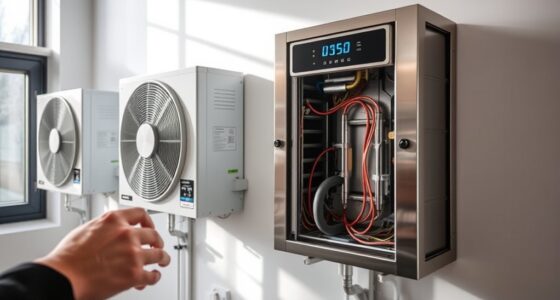As experts in the field, we are striving to assess the efficiency of heat pumps in utilizing renewable energy sources. Are heat pumps really effective in renewable energy systems?
In this article, we will delve into the various factors that influence their efficiency and compare their performance to other renewable energy technologies.
Furthermore, we will provide valuable tips on how to maximize the efficiency of heat pumps in the context of renewable energy systems.
Join us as we explore the truth behind heat pump efficiency in renewable energy applications.

Key Takeaways
- Heat pumps play a crucial role in extracting heat from the environment for heating purposes in renewable energy systems.
- The efficiency of heat pumps is measured by the coefficient of performance (COP), which indicates the ratio of heat output to electricity consumed.
- Factors such as temperature difference, refrigerant type, system design, and maintenance practices significantly impact the efficiency of heat pumps in renewable energy systems.
- While heat pumps may have lower energy conversion rates compared to technologies like solar panels, they can be highly efficient in geothermal systems due to the constant ground temperature.
The Role of Heat Pumps in Renewable Energy Systems
Heat pumps play a critical role in renewable energy systems. These systems utilize heat pump technology to extract heat from the environment, such as the air, ground, or water, and transfer it indoors for heating purposes.
The integration of heat pumps into renewable energy systems presents several challenges that need to be addressed. One of the main challenges is optimizing the efficiency of the heat pump system to maximize the use of renewable energy sources. This involves designing heat pumps with high coefficients of performance (COP) and implementing advanced control strategies.
Another challenge is ensuring the seamless integration of heat pumps with other renewable energy technologies, such as solar panels or wind turbines. This requires developing smart energy management systems that can effectively balance the energy generation and consumption within the system.
Understanding Heat Pump Efficiency in Renewable Energy Applications
We need to examine the overall efficiency of heat pumps in renewable energy applications to determine their effectiveness. Heat pump performance is a crucial factor to consider when evaluating the viability of renewable heating systems. The efficiency of a heat pump is typically measured by its coefficient of performance (COP), which is the ratio of heat output to the amount of electricity consumed. A higher COP indicates a more efficient heat pump.

However, it’s important to understand that heat pump performance can be influenced by various factors, such as the temperature difference between the heat source and the heat sink, the type of refrigerant used, and the design and operation of the system. By understanding these factors, we can gain insight into the efficiency of heat pumps in renewable energy systems and identify potential areas for improvement.
Now, let’s delve into the factors affecting the efficiency of heat pumps in renewable energy systems.
Factors Affecting the Efficiency of Heat Pumps in Renewable Energy Systems
To better understand the efficiency of heat pumps in renewable energy systems, it is important to examine the factors that can affect their performance. One key factor is heat pump performance, which is influenced by several variables such as the type and size of the heat pump, the quality of its components, and the maintenance practices employed. Another factor is energy consumption, which can be affected by the heat pump’s operating conditions, including temperature differentials and load variations. A 2 column and 4 row table is provided below to summarize these factors and their impact on heat pump efficiency:
| Factors Affecting Heat Pump Efficiency | Impact on Heat Pump Performance |
|---|---|
| Type and size of heat pump | Determines heating capacity |
| Quality of components | Affects reliability and lifespan |
| Maintenance practices | Ensures optimal performance |
| Operating conditions | Influences energy consumption |
Comparing the Efficiency of Heat Pumps to Other Renewable Energy Technologies
When comparing the efficiency of heat pumps to other renewable energy technologies, it’s important to consider factors such as energy conversion rates and environmental impacts.

Heat pumps, while efficient in their own right, can be compared to solar panels in terms of efficiency. Solar panels convert sunlight directly into electricity, making them highly efficient at harnessing renewable energy.
Heat pumps, on the other hand, use electricity to extract heat from the environment and transfer it indoors or outdoors, depending on the desired heating or cooling effect. While heat pumps have a lower energy conversion rate compared to solar panels, they can still be highly efficient in geothermal systems.
In these systems, heat pumps extract heat from the ground, which maintains a relatively constant temperature throughout the year, resulting in improved overall efficiency.
When comparing heat pumps to other renewable energy technologies, it’s crucial to consider the specific application and environmental factors to determine their true efficiency.

Tips for Maximizing Heat Pump Efficiency in Renewable Energy Systems
In order to optimize heat pump efficiency in renewable energy systems, we must focus on proper system sizing and regular maintenance. By following these tips, we can maximize the performance of heat pumps and optimize renewable energy systems:
Proper system sizing: It’s crucial to ensure that the heat pump is correctly sized for the space it will be heating or cooling. Undersized or oversized systems can result in reduced efficiency and increased energy consumption.
Regular maintenance: Regular maintenance is essential to keep the heat pump operating at its peak efficiency. This includes cleaning or replacing filters, checking refrigerant levels, and inspecting electrical components. Neglecting maintenance can lead to decreased performance and higher energy costs.
Optimizing control settings: Adjusting the control settings of the heat pump can help maximize efficiency. Setting the thermostat to the appropriate temperature and utilizing programmable settings can reduce energy waste and ensure optimal comfort.

Frequently Asked Questions
What Is a Heat Pump and How Does It Work in Renewable Energy Systems?
Heat pump technology is a system that transfers heat from one location to another, using a small amount of energy. It offers numerous advantages in renewable energy systems, such as high efficiency and the ability to use renewable heat sources.
Are Heat Pumps a Cost-Effective Option for Renewable Energy Systems?
Heat pumps are a highly cost-effective option for renewable energy systems. Their efficiency allows for significant energy savings, reducing environmental impact. They are like the Swiss Army knife of renewable energy – versatile and effective.
Can Heat Pumps Be Used in All Types of Renewable Energy Systems?
Heat pumps can be used in off-grid systems and integrated with solar power. They provide efficient heating and cooling, reducing reliance on fossil fuels. This integration enhances the overall efficiency of renewable energy systems.
What Are Some Potential Drawbacks or Limitations of Using Heat Pumps in Renewable Energy Systems?
Potential drawbacks and limitations of heat pumps in renewable energy systems include their energy efficiency and high upfront costs. However, they can still be a viable option, especially when considering their long-term benefits and contribution to sustainability.

Are There Any Government Incentives or Subsidies Available for Installing Heat Pumps in Renewable Energy Systems?
Yes, there are government incentives and subsidies available for installing heat pumps in renewable energy systems. These programs aim to promote the adoption of efficient technologies and reduce reliance on fossil fuels.
What Are Some Ways to Maximize Energy Efficiency with Heat Pumps in a Home?
To achieve maximum energy efficiency with heat pumps in a home, there are a few strategies to consider. First, make sure the heat pump is properly sized for your home and climate. Regular maintenance, including cleaning or replacing air filters, is crucial. Insulating walls, floors, and attics can help retain the generated heat. Finally, setting the thermostat to optimal temperatures and utilizing zoning techniques can further enhance energy efficiency.
Conclusion
In conclusion, heat pumps have proven to be highly efficient in renewable energy systems. By understanding and optimizing their efficiency in these applications, we can maximize the benefits of this technology.
Factors such as proper sizing, maintenance, and integration with other renewable energy technologies play a crucial role in achieving optimal performance.
While there are other renewable energy technologies available, heat pumps offer a reliable and efficient solution for meeting our heating and cooling needs while reducing our carbon footprint.










